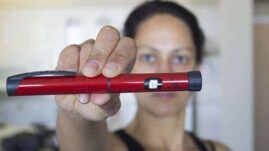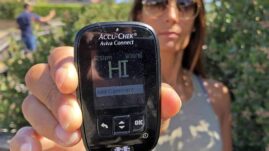Managing blood sugars is hard during the day when you are awake and have control over manipulating insulin bolus and basal rates to accommodate carbohydrates, exercise, stress, and hormones.
Tackling blood sugars overnight is a whole different problem that needs to be dealt with delicately to make sure you’re fine-tuning your control and staying healthy.
Many people with diabetes struggle with stubborn overnight blood sugars, but there are some things you can do to help control this.
This article will highlight the main ways you can avoid overnight high blood sugars and wake up feeling well and refreshed.

Why do blood sugars spike overnight?
As with everything diabetes, the answer is nuanced and can depend on the person and their situation, but mostly blood sugars tend to spike overnight because we’re not keeping as close of a watch on them.
Think about it: two hours after breakfast or lunch, you’re probably testing your blood sugar or monitoring it on your continuous glucose monitor (CGM), tracking changes, and dosing appropriately. That same eye for detail is required after exercise, where you normally treat with appropriate low snacks before it becomes dangerous.
That isn’t the case when you’re sleeping 7-9 hours per night, which can cause people with diabetes a lot of problems.
Ways to help avoid overnight high blood sugar
While you can’t prevent all hyperglycemic events overnight forever, these strategies can help mitigate the problem and alleviate a lot of high blood sugar stress.
Try these out and see if you notice any improvement in your overall diabetes management and/or A1c!
Make good use of technology
Technology such as insulin pumps and continuous glucose monitors are there to help you. If you’re noticing a lot of high blood sugars overnight, tinker with your basal and bolus rates at dinner time and before bed.
Most people need a lot more insulin overnight to help combat the dawn phenomenon, so don’t feel bad or guilty if your basal rate overnight is twice (or more!) what you require during the day.
In addition, set high blood sugar alarms on your CGM (my overnight alarm goes off when my blood sugar hits 200), so you can wake up and take insulin if needed.
If you’re on a hybrid closed-loop system such as the Medtronic 670g, 770g, Tslim Control IQ, or DIY Loop, your insulin pump will automatically increase your basal rates to help combat overnight highs, but if you are not, you can do this manually.
Don’t eat too close to bedtime
Technology is supposed to mean more freedom for people with diabetes, but that doesn’t mean a midnight ice-cream sundae won’t send your blood sugars skyrocketing.
Eating too close to bedtime makes not only digestion more difficult, but you also don’t know how you’ll react to the food you’ve eaten if you’re asleep.
Try to stop all meals and snacks (except for treating any low blood sugars, of course) about 3 hours before bedtime so you can closely monitor postprandial blood sugars and make a correction dose if needed.
You may need to reassess your insulin to carbohydrate ratios and basal programs in the evening, too, so make sure you’re fine-tuning your insulin sensitivity and correction factors, as evening mealtime boluses can often wreak havoc on overnight blood sugars when not calibrated correctly.
Keep in mind that high fat and high protein meals digest a lot more slowly, so even if you’re not having many carbohydrates at night, you may still suffer from delayed high blood sugars if you haven’t bolused appropriately.
Exercise everyday
Exercise really is the best medicine, and for blood sugar control it’s no different. Getting some movement in every single day will help stabilize your blood sugars for smoother sailing overnight.
Exercise also increases insulin sensitivity, making those later in the day meals easier to bolus for.
According to the Centers for Disease Control and Prevention (CDC), most adults should aim for at least 150 minutes of moderate-intensity aerobic physical activity or 75 minutes of vigorous-intensity physical activity each week, amounting to about 30 minutes per day.
Stay hydrated!
According to the Mayo Clinic, the average male adult requires about 3.7 liters of fluid a day, and the average woman requires 2.7 liters of fluid per day (more if you exercise regularly), but one study found that nearly 75% of Americans are chronically dehydrated!
Water is vital for health and vitality, and that includes good diabetes management. Insulin resistance can kick in if you haven’t had enough liquids and/or you’re chronically dehydrated, so make sure to fill up during the day with water and other no-sugar drinks such as coffee, tea, or flavored seltzer water.
Get into a good bedtime routine
Studies have found that the majority of people with diabetes struggle to get quality sleep. This is due to many factors, such as frequent thirst and urination, nerve pain, low and high blood sugars, and even hunger.
One way to help improve your sleep and avoid high blood sugar overnight is by getting into a good bedtime routine. Try and wake up and go to sleep at the same time every night to normalize your hormone cycles, prepare your mind for sleep by limiting screens a few hours before bed and doing something relaxing instead, such as yoga, meditation, reading, or journaling.
Keep the lights in your bedroom low and the room temperature a little cool, and lastly, keep all electronics out of the bedroom, except for your CGM, insulin pump, and CGM receiver (which may be a smartphone).
The ease of predictability will make managing your blood sugars a lot better and you will avoid a lot of high blood sugars as a result.
Set alarms
If you are not on a hybrid-closed loop system or CGM and are struggling with middle-of-the-night lows, try setting an alarm for every 2 hours to do some at-home basal-testing.
Track when your blood sugar is starting to creep up and make adjustments as needed. This can be brutal for the few nights that you’re doing it, but figuring out exactly when and how your blood sugars are going up will help you fine-tune your management (such as splitting your long-acting insulin dose into two doses, or changing the timing of your evening insulin dose) and prevent chronic overnight hyperglycemia.
Always talk with your doctor first before making any such changes.
Give yourself some grace
It’s important to keep in mind that diabetes management is HARD work. If it were easy, everyone would have perfect blood sugars and A1c! Our bodies are constantly growing and changing, and so should our diabetes management.
Be flexible with what your body needs, and work with your doctor when making any drastic changes to your insulin therapy. And perfection is not the ideal.
Continually making progress on diabetes management includes mental health and well-being too, so don’t stress out too much over blood sugars that aren’t perfect overnight. If you’re having stubborn issues, enlist the support of family and friends to help.
Managing the ups and downs of diabetes is hard any time of day, but can be especially difficult overnight when we’re supposed to be sleeping and getting the rest we need, but with these strategies, hopefully, overnight high blood sugars will become a thing of the past.
Always work with your medical team before instituting any major changes to your diabetes management and/or insulin therapy.



ANNE
Canadian numbers re blood sugars would be helpful
Judy
I’m sorry I don’t know the person’s name, but she said she sets her Dexcom to ring when it reaches 200. How do you keep blood sugar below 200 all the time? It’s very difficult, I’m new to Dexcom 7 but I love it. My blood sugar goes way up between 10 pm and 11 no matter what. I try and correct it but then I face lows during the night. My A1c’s are always 8 point something.
Christel Oerum, MS
Diabetes management isn’t easy. It will come down to balancing out your insulin. So you could talk to your medical team about adjusting your dinner dose or doses for evening snacks. I find it helpful to have dinner before 7 PM and stop eating after that. Another thing to pay attention to is how much fat is in your evening meal. If it’s high fat you’ll almost always need a second dose of insulin a few hours later as fat slows down how fast food will impact your blood sugar
Ian Tonge
Great advice, a great group to be connected with.
Being a real long-term t1d, even I get a lot out of these posts. Thanks
Reg Munro Cape Town
I’m finding my bg goes up some times, starting three hours after a meal. Is this signal for positive Gastroparesis? I suffer none of the listed awkward symptoms
Christel Oerum
Not necessarily. If you eat very high-fat meals that could also delay the release of glucose into your bloodstream and you would need a second dose of insulin hours after the meal
Richard A Gary
Insightful and hope you keep sharing such wonderful ideas with us